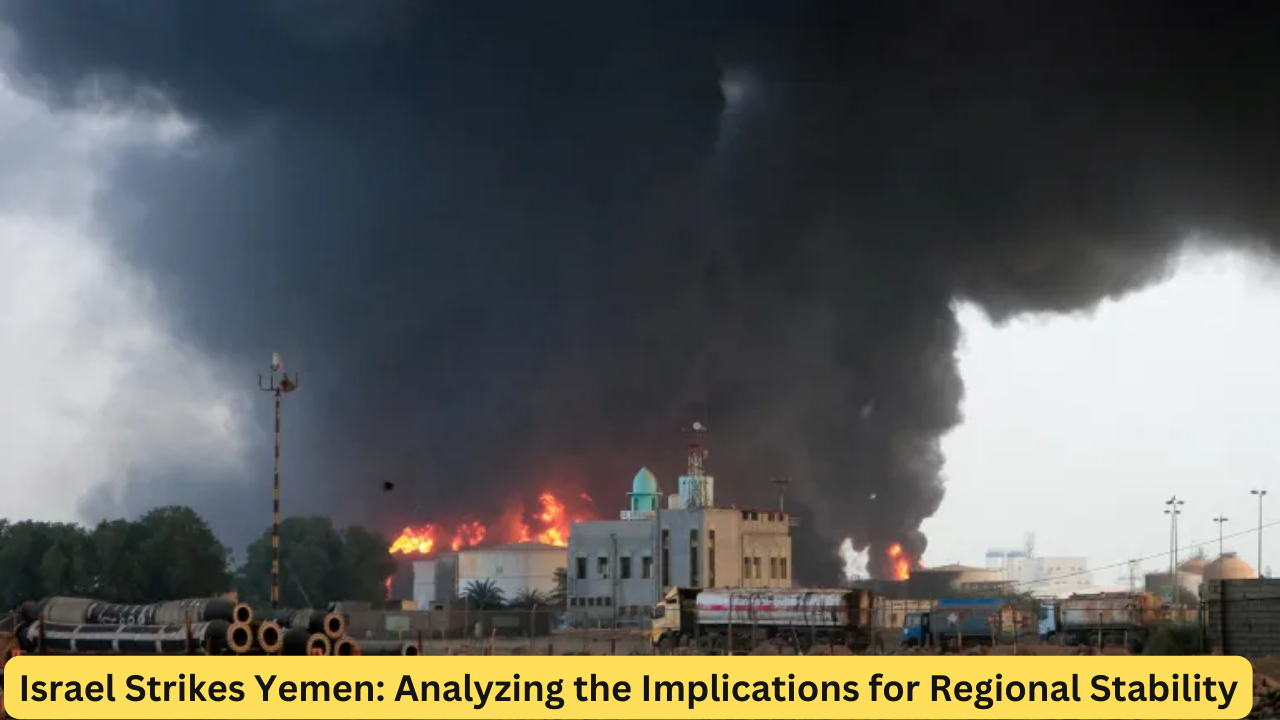Introduction
The recent Israeli strikes on Yemen have sent shockwaves through the geopolitical landscape of the Middle East. The escalation in military action has significant implications for the region’s stability, security dynamics, and international relations. This article delves deeply into the context, causes, and consequences of these strikes, providing a comprehensive analysis of the situation.
Background of the Conflict
Yemen, a country in the Arabian Peninsula, has been embroiled in conflict for years. The Yemeni Civil War began in 2014 when Houthi rebels, supported by Iran, took control of the capital, Sanaa. The situation deteriorated further with the intervention of a Saudi-led coalition in 2015, which aimed to restore the internationally recognized government of President Abdrabbuh Mansur Hadi. The ongoing conflict has led to a severe humanitarian crisis, with millions displaced and widespread suffering.
Israel’s involvement in this conflict is a recent development that underscores the growing complexity of the regional power dynamics. Historically, Israel’s primary focus in the Middle East has been its interactions with neighboring states and the Palestinian territories. However, recent events have expanded Israel’s strategic interests into Yemen.
Details of the Israeli Strikes
The Israeli strikes in Yemen are reported to have targeted military installations and facilities associated with the Houthi rebels. These strikes are believed to be a response to increasing Houthi attacks on Israeli and allied interests in the region. The Israeli government has not officially confirmed its involvement, but evidence from satellite imagery and intelligence sources suggests that the strikes were precise and well-coordinated.
Strategic Objectives
Israel’s strategic objectives in Yemen appear multifaceted. Firstly, the strikes aim to disrupt the supply lines and operational capabilities of the Houthi rebels, who have reportedly received support from Iran. By targeting key facilities, Israel seeks to weaken the rebels’ ability to launch attacks and destabilize the region further.
Secondly, these actions can be seen as a message to Iran, Israel’s primary regional adversary. Iran’s influence in Yemen through the Houthis represents a significant threat to Israeli security. The strikes are thus part of a broader strategy to counter Iranian expansionism and assert Israel’s influence in the Arabian Peninsula.
Impact on Yemen’s Humanitarian Crisis
The humanitarian impact of the Israeli strikes on Yemen cannot be overstated. Yemen was already experiencing one of the world’s worst humanitarian crises before these strikes. The addition of foreign military intervention exacerbates the suffering of civilians, who are caught in the crossfire of international conflicts.
Reports indicate that the strikes have caused additional civilian casualties and damage to critical infrastructure. This further complicates efforts to provide humanitarian aid and exacerbates the already dire living conditions for millions of Yemenis. The international community faces a challenging situation in addressing both the immediate humanitarian needs and the broader geopolitical ramifications of the conflict.
Regional Reactions and Implications
Responses from Arab States
The Israeli strikes have elicited strong reactions from various Arab states. Countries in the Gulf region, particularly those involved in the Saudi-led coalition, have expressed concern over the escalation. While some view the strikes as a necessary action against a common adversary, others worry about the potential for increased instability in an already volatile region.
Iran’s Position
Iran, a key supporter of the Houthi rebels, has condemned the Israeli strikes as an act of aggression. Iran’s response includes potential military and diplomatic measures to counteract Israeli influence in Yemen. The situation has heightened tensions between Israel and Iran, potentially leading to further regional confrontations.
International Community’s Stance
The international community is closely monitoring the situation. Organizations such as the United Nations have called for restraint and dialogue to prevent further escalation. However, the complex web of alliances and rivalries in the region makes diplomatic solutions challenging. The international response will likely play a crucial role in shaping the future course of the conflict.
Future Prospects and Scenarios
The future of the conflict in Yemen and the broader implications of the Israeli strikes are uncertain. Several potential scenarios could unfold:
- Escalation of Conflict: The strikes could lead to a further escalation of military actions by both sides, increasing the risk of a larger regional conflict. The involvement of external actors such as Israel and Iran may draw in additional parties, complicating efforts to achieve a resolution.
- Diplomatic Efforts: Increased international pressure and diplomatic efforts could lead to renewed peace talks and negotiations. The involvement of major powers and regional actors may help facilitate dialogue and potentially reach a resolution to the conflict.
- Humanitarian Crisis Intensification: The continued conflict and foreign intervention could further exacerbate the humanitarian crisis in Yemen. The international community must address both immediate and long-term needs to alleviate the suffering of the Yemeni people.
Conclusion
The recent Israeli strikes in Yemen mark a significant development in the ongoing conflict and regional dynamics. The situation remains fluid, with potential implications for both the immediate conflict and broader geopolitical relations. As the international community grapples with the ramifications, it is crucial to remain informed and engaged in efforts to address the complex challenges facing the region.
